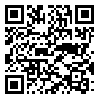Volume 31, Issue 3 (6-2023)
JSSU 2023, 31(3): 6463-6471 |
Back to browse issues page
Ethics code: IR.UT.PSYEDU.REC.1401.065
Download citation:
BibTeX | RIS | EndNote | Medlars | ProCite | Reference Manager | RefWorks
Send citation to:



BibTeX | RIS | EndNote | Medlars | ProCite | Reference Manager | RefWorks
Send citation to:
Shekari H, Ghorbani N, Rostami R, Frederickson J, Abbasi M, Eftekhari A. An Overview of Addiction Potential and the Role of Narcissistic Factors, Shame Experiences and Attachment Patterns. JSSU 2023; 31 (3) :6463-6471
URL: http://jssu.ssu.ac.ir/article-1-5876-en.html
URL: http://jssu.ssu.ac.ir/article-1-5876-en.html
Hossein Shekari 

 , Nima Ghorbani *
, Nima Ghorbani * 

 , Reza Rostami
, Reza Rostami 

 , Jon Frederickson
, Jon Frederickson 

 , Maryam Abbasi
, Maryam Abbasi 

 , Asie Eftekhari
, Asie Eftekhari 




 , Nima Ghorbani *
, Nima Ghorbani * 

 , Reza Rostami
, Reza Rostami 

 , Jon Frederickson
, Jon Frederickson 

 , Maryam Abbasi
, Maryam Abbasi 

 , Asie Eftekhari
, Asie Eftekhari 


Abstract: (1861 Views)
Introduction: The problem of addiction potential experienced by young adults is usually accompanied by narcissistic personality traits. Research has confirmed two distinct forms of narcissism: grandiose and vulnerable. Meanwhile, shame as the main emotion and attachment style plays an essential role in these disorders. Therefore, the present study was conducted with the aim of reviewing research on addiction potential and the role of narcissistic factors, shame experiences, and attachment patterns. Using the Google Scholar database, key words such as Addiction Potential, Narcissism, Shame and Attachment Style were searched. PubMed was searched for Addiction, Narcissistic Personality Disorder, shame, and Attachment Styles. All time periods were used for this review and more than two hundred documents were reviewed and extracted based on the criteria.
Conclusion: The results showed that in some studies, a significant relationship was observed among potential for addiction, narcissism, shame experiences, and attachment patterns; in some other studies, potential for addiction was predictable through narcissism, shame experiences, and attachment patterns.
In general, we can conclude that addiction is a big problem that is affecting many societies today, by identifying how these factors are formed in children and development paths affecting it, a big step can be taken in the direction of educating parents and communities.
Conclusion: The results showed that in some studies, a significant relationship was observed among potential for addiction, narcissism, shame experiences, and attachment patterns; in some other studies, potential for addiction was predictable through narcissism, shame experiences, and attachment patterns.
In general, we can conclude that addiction is a big problem that is affecting many societies today, by identifying how these factors are formed in children and development paths affecting it, a big step can be taken in the direction of educating parents and communities.
Keywords: Shame, Attachment Style, Vulnerable Narcissist, Grandiose Personality Narcissist, Addiction Potential.
Type of Study: Review article |
Subject:
Psychology
Received: 2022/11/23 | Accepted: 2023/02/6 | Published: 2023/06/5
Received: 2022/11/23 | Accepted: 2023/02/6 | Published: 2023/06/5
Send email to the article author
| Rights and permissions | |
 |
This work is licensed under a Creative Commons Attribution-NonCommercial 4.0 International License. |




